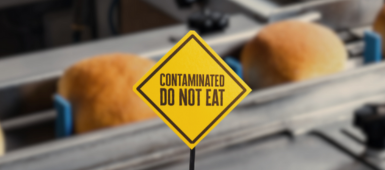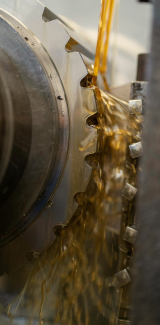
In food manufacturing and production facilities, safety is a top priority!
As manufacturers work to meet consumer demands while ensuring compliance with health and safety regulations, one crucial aspect often overlooked is the importance of food grade lubricants. Chain Guard, a leading brand in the lubricant industry, offers a range of superior NSF H1 food-grade registered lubricants that ensure optimal machine performance while safeguarding food products from contamination.
What is the Role of NSF in Food Safety?
NSF International plays a vital role in ensuring food safety by certifying non-food compounds like lubricants, greases, and chemicals used in food processing areas. These products, while not directly part of the food production process, can come into incidental contact with food, and thus, they must adhere to strict safety and quality standards.
According to NSF's guidelines, H1 lubricants are used in applications where incidental food contact is possible. This category includes lubricants for equipment such as mixers, conveyors, or bottling machinery, where even minor exposure could lead to contamination. At Chain Guard Lubricants, we ensure that all our products are NSF H1 registered, making them compliant with global food safety standards.

In food manufacturing and production facilities, safety is a top priority!
As manufacturers work to meet consumer demands while ensuring compliance with health and safety regulations, one crucial aspect often overlooked is the importance of food grade lubricants. Chain Guard, a leading brand in the lubricant industry, offers a range of superior NSF H1 food-grade registered lubricants that ensure optimal machine performance while safeguarding food products from contamination.
What is the Role of NSF in Food Safety?
NSF International plays a vital role in ensuring food safety by certifying non-food compounds like lubricants, greases, and chemicals used in food processing areas. These products, while not directly part of the food production process, can come into incidental contact with food, and thus, they must adhere to strict safety and quality standards.
According to NSF's guidelines, H1 lubricants are used in applications where incidental food contact is possible. This category includes lubricants for equipment such as mixers, conveyors, or bottling machinery, where even minor exposure could lead to contamination. At Chain Guard Lubricants, we ensure that all our products are NSF H1 registered, making them compliant with global food safety standards.

In food manufacturing production facilities, safety is a top priority!
As manufacturers work to meet consumer demands while ensuring compliance with health and safety regulations, one crucial aspect often overlooked is the importance of food grade lubricants. Chain Guard, a leading brand in the lubricant industry, offers a range of superior NSF H1 food-grade registered lubricants that ensure optimal machine performance while safeguarding food products from contamination.
What is the Role of NSF in Food Safety?
NSF International plays a vital role in ensuring food safety by certifying non-food compounds like lubricants, greases, and chemicals used in food processing areas. These products, while not directly part of the food production process, can come into incidental contact with food, and thus, they must adhere to strict safety and quality standards.
According to NSF's guidelines, H1 lubricants are used in applications where incidental food contact is possible. This category includes lubricants for equipment such as mixers, conveyors, or bottling machinery, where even minor exposure could lead to contamination. At Chain Guard Lubricants, we ensure that all our products are NSF H1 registered, making them compliant with global food safety standards.
Why NSF H1 Food Grade Certification Matters?
NSF H1 certification is crucial for any food processing operation. Certification requires the lubricant to meet strict standards for safety, toxicity, and performance. For food manufacturers, using NSF H1 registered products helps protect the integrity of their food products, ensuring that machinery can operate safely and effectively.
Historically, the U.S. Department of Agriculture (USDA) was responsible for reviewing and approving non-food compounds for use in food processing facilities. However, in 1999, NSF International took over the role of certifying these products. Today, NSF’s third-party certification program rigorously tests lubricants and other substances to ensure they meet the necessary standards for incidental food contact. This certification is a critical part of a robust HACCP (Hazard Analysis and Critical Control Points) plan. [source]
Why NSF H1 Food Grade Certification Matters?
NSF H1 certification is crucial for any food processing operation. Certification requires the lubricant to meet strict standards for safety, toxicity, and performance. For food manufacturers, using NSF H1 registered products helps protect the integrity of their food products, ensuring that machinery can operate safely and effectively.
Historically, the U.S. Department of Agriculture (USDA) was responsible for reviewing and approving non-food compounds for use in food processing facilities. However, in 1999, NSF International took over the role of certifying these products. Today, NSF’s third-party certification program rigorously tests lubricants and other substances to ensure they meet the necessary standards for incidental food contact. This certification is a critical part of a robust HACCP (Hazard Analysis and Critical Control Points) plan. [source]
NSF H1 certification is crucial for any food processing operation. Certification requires the lubricant to meet strict standards for safety, toxicity, and performance. For food manufacturers, using NSF H1 registered products helps protect the integrity of their food products, ensuring that machinery can operate safely and effectively.
Historically, the U.S. Department of Agriculture (USDA) was responsible for reviewing and approving non-food compounds for use in food processing facilities. However, in 1999, NSF International took over the role of certifying these products. Today, NSF’s third-party certification program rigorously tests lubricants and other substances to ensure they meet the necessary standards for incidental food contact. This certification is a critical part of a robust HACCP (Hazard Analysis and Critical Control Points) plan. [source]
At Chain Guard, we provide an unwavering commitment to producing high-quality, NSF H1 registered lubricants. These lubricants are formulated to ensure food safety while maintaining the highest levels of performance in food processing environments.
Top 4 Benefits of Chain Guard NSF H1 Lubricants:
At Chain Guard, we provide an unwavering commitment to producing high-quality, NSF H1 registered lubricants. These lubricants are formulated to ensure food safety while maintaining the highest levels of performance in food processing environments.
Top 4 Benefits of Chain Guard NSF H1 Lubricants:
 |
Food Safety Compliance |
 |
High Performance |
 |
Reduced in Contamination Risks |
 |
Extended Equipment Lifespan |
 |
Food Safety Compliance |
 |
High Performance |
 |
Reduced in Contamination Risks |
 |
Extended Equipment Lifespan |
 |
Food Safety Compliance |
 |
High Performance |
 |
Reduced in Contamination Risks |
 |
Extended Equipment Lifespan |
As Ashley Breitner, Business Unit Manager at NSF International, explains, a strong HACCP plan focuses on identifying and controlling risks in food production, and this includes ensuring that machinery and equipment are properly maintained with the correct lubricants. At Chain Guard, we understand the importance of incorporating NSF H1 certified products into a food processing HACCP plan. Using registered non-food compounds as part of this plan helps to ensure compliance with Global Food Safety Initiative (GFSI) standards.
Lubricants categorized as NSF H1 are formulated for incidental contact with food and are essential in preventing cross-contamination. These products are meticulously tested and registered, following a thorough review of their formulation and manufacturing process. As the food industry continues to prioritize safety and risk management, the demand for these certified lubricants continues to grow, especially in key global markets.
As Ashley Breitner, Business Unit Manager at NSF International, explains, a strong HACCP plan focuses on identifying and controlling risks in food production, and this includes ensuring that machinery and equipment are properly maintained with the correct lubricants. At Chain Guard, we understand the importance of incorporating NSF H1 certified products into a food processing HACCP plan. Using registered non-food compounds as part of this plan helps to ensure compliance with Global Food Safety Initiative (GFSI) standards.
Lubricants categorized as NSF H1 are formulated for incidental contact with food and are essential in preventing cross-contamination. These products are meticulously tested and registered, following a thorough review of their formulation and manufacturing process. As the food industry continues to prioritize safety and risk management, the demand for these certified lubricants continues to grow, especially in key global markets.
As Ashley Breitner, Business Unit Manager at NSF International, explains, a strong HACCP plan focuses on identifying and controlling risks in food production, and this includes ensuring that machinery and equipment are properly maintained with the correct lubricants. At Chain Guard, we understand the importance of incorporating NSF H1 certified products into a food processing HACCP plan. Using registered non-food compounds as part of this plan helps to ensure compliance with Global Food Safety Initiative (GFSI) standards.
Lubricants categorized as NSF H1 are formulated for incidental contact with food and are essential in preventing cross-contamination. These products are meticulously tested and registered, following a thorough review of their formulation and manufacturing process. As the food industry continues to prioritize safety and risk management, the demand for these certified lubricants continues to grow, especially in key global markets.
As food safety regulations tighten and global awareness of food contamination risks grows, more manufacturers are seeking certified food-grade lubricants. According to the NSF, there has been a substantial increase in the registration of H1 lubricants over the past decade, with thousands of products now certified for safe use in food processing facilities.
Chain Guard Lubricants is at the forefront of this trend, providing food manufacturers with reliable, certified products that meet the highest standards of safety and performance. Our commitment to continuous improvement and adherence to NSF regulations ensures that we remain a trusted partner to food production companies around the world.
As food safety regulations tighten and global awareness of food contamination risks grows, more manufacturers are seeking out certified food-grade lubricants. According to the NSF, there has been a substantial increase in the registration of H1 lubricants over the past decade, with thousands of products now certified for safe use in food processing facilities.
Chain Guard Lubricants at the forefront of this trend, providing food manufacturers with reliable, certified products that meet the highest standards of safety and performance. Our commitment to continuous improvement and adherence to NSF regulations ensures that we remain a trusted partner for food production companies around the world.
In conclusion, Chain Guard Lubricants is dedicated to promoting food safety through our wide range of NSF H1 registered lubricants. For food manufacturers looking to protect their products and consumers, Chain Guard lubricants offer the perfect solution. By choosing Chain Guard NSF certified products, businesses can be confident that they are meeting global food safety standards while maintaining the efficiency and longevity of their equipment.
Food safety is an ongoing priority for the food industry, and Chain Guard Lubricants is leading the way in providing essential products that help manufacturers meet their safety goals.
In conclusion, Chain Guard Lubricants is dedicated to promoting food safety through our wide range of NSF H1 registered lubricants. For food manufacturers looking to protect their products and consumers, Chain Guard lubricants offer the perfect solution. By choosing Chain Guard NSF-certified products, businesses can be confident that they are meeting global food safety standards while maintaining the efficiency and longevity of their equipment.
Food safety is an ongoing priority for the food industry, and Chain Guard Lubricants is leading the way in providing essential products that help manufacturers meet their safety goals.
-1.png)
.png)
-1.png)


